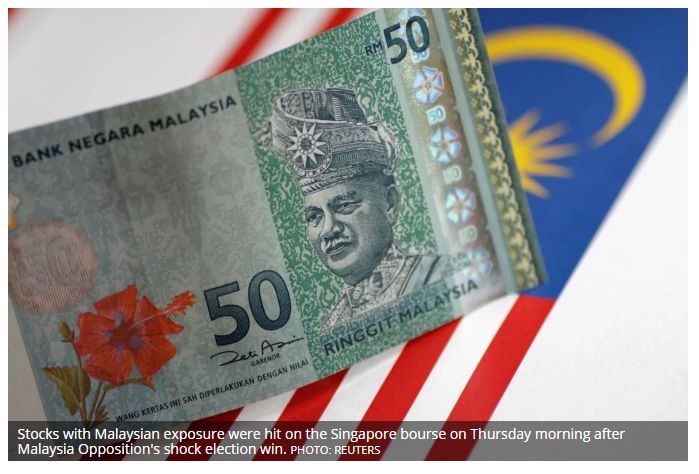Malaysia elections: Ringgit falls as high-speed rail, GST among analysts’ top uncertainties
STOCKS with Malaysian exposure were hit on the Singapore bourse on Thursday morning after Malaysia Opposition’s shock election win.
As at 11am, Singapore-listed stocks with Malaysian exposure such as Jardine Cycle & Carriage, IHH Healthcare and Hatten Land fell. Jardine C&C was down 81 Singapore cents or 2.4 per cent to S$33.07, IHH Healthcare down five Singapore cents or 2.5 per cent to S$1.98, and Hatten Land down 0.1 Singapore cent or 0.6 per cent to S$0.16. Fraser and Neave bucked the trend with a one Singapore cent or 0.5 per cent rise to S$2.09.
By 11.02am, Singapore’s Straits Times Index was down 0.78 point or 0.02 per cent to 3,547.76.
Malaysia’ stock exchange was closed on Thursday and Friday, which Eli Lee, head of investment strategy at Bank of Singapore, reckoned was a positive, saying: “This allows market sentiment to settle as we receive more clarity on policy direction from the new government.”
“The Opposition’s stunning win, reminiscent of Brexit and the US presidential election, has kicked off a period of high uncertainty in Malaysian markets. A classic knee-jerk reaction is at play.”
On the currency front, the one-month offshore ringgit non-deliverable forwards, which are contracts that will cash-settle changes in the value of the Malaysian ringgit against the US dollar, fell 4.3 per cent overnight, valuing the US dollar at 4.18925 ringgit as at 9.13am.
DBS said it had expected the ringgit to depreciate, with or without the election upset.
“Our forecast for the ringgit to depreciate to 4.20 by the end of this year was formulated before the election. This was based on our expectation for a resurgent US dollar from a more hawkish US growth/inflation/rates outlook and a moderation in the eurozone’s momentum. We did not expect the externally-dependent Malaysian economy to repeat last year’s stellar 5.9 per cent growth and looked for a pullback towards 5 per cent in 2018.”
It added that while rising oil prices should be a positive to the net oil exporter country, the downside risks from rising trade protectionism and higher US rates should challenge “unrealistic” consensus expectations that the ringgit will extend its appreciation towards 3.80 this year.
Fidelity International, too, expects the ringgit to weaken, citing the market’s dislike of uncertainties and added concerns over the new government’s fiscal spending.
There is also concern about major infrastructure projects such as the High Speed Rail (HSR), which analysts say could be revisited.
Fidelity said: “Mahathir in the past has said he will scrap the large ‘unnecessary’ mega projects such as the HSR as he disagreed with the large debt taken to fund these projects. However, Mahathir himself was not anti-infrastructure spending during his time as prime minister and he actually proposed all the big infrastructure projects. The new government may go back to the drawing board and decide which projects make sense near term. We expect infrastructure spending to be reduced to refocus on fuel subsidies and the removal of GST, but longer term, infrastructure projects should come back into focus.”
DBS added that: “For Singapore, the uncertainty is in a delay or in the worst case, a cancellation of the High Speed Railway project as the new government has vowed to review all mega projects that have been awarded to foreign parties.”
Credit ratings agency Moody’s described the election outcome as being credit negative for Malaysia’s sovereign rating, saying: “Little is known about the Opposition’s full range of economic policies, and its electoral pledges have lacked details that would allow for a full assessment of their budgetary and macroeconomic impact.
“Some campaign promises, if implemented without any other adjustments, would be credit negative for Malaysia’s sovereign. These include a proposed abolishment of the GST (goods and services tax) which, without offsetting measures, would increase Malaysia’s reliance on oil-related revenues and, in the near term at least, narrow the government’s revenue base. Another policy pledge, the reintroduction of fuel subsidies, would also distort market-determined price mechanisms, with effects on both the fiscal position and balance of payments.”
Oanda Trading Market called the overnight results announcement “stunning”, and agreed that abolishing the GST and accelerating fiscal spending could be interpreted negatively, given the drain on government coffers, which would be credit negative for Malaysia.
Mr Lee from Bank of Singapore said: “Mahathir has also publicly stated that he would relook at Chinese investments that he alleged brought too little benefit to the country, but it remains to be seen how his rhetoric will be translated into actual policy. At a time of growing pressure on emerging market currencies and bonds, the situation in Malaysia bears careful watching for potential knock-on effects, particularly as rising rates and geopolitical uncertainties remain live in the backdrop.”
Source: http://www.businesstimes.com.sg/companies-markets/malaysia-elections-ringgit-falls-as-high-speed-rail-gst-among-analysts-top


 English
English




